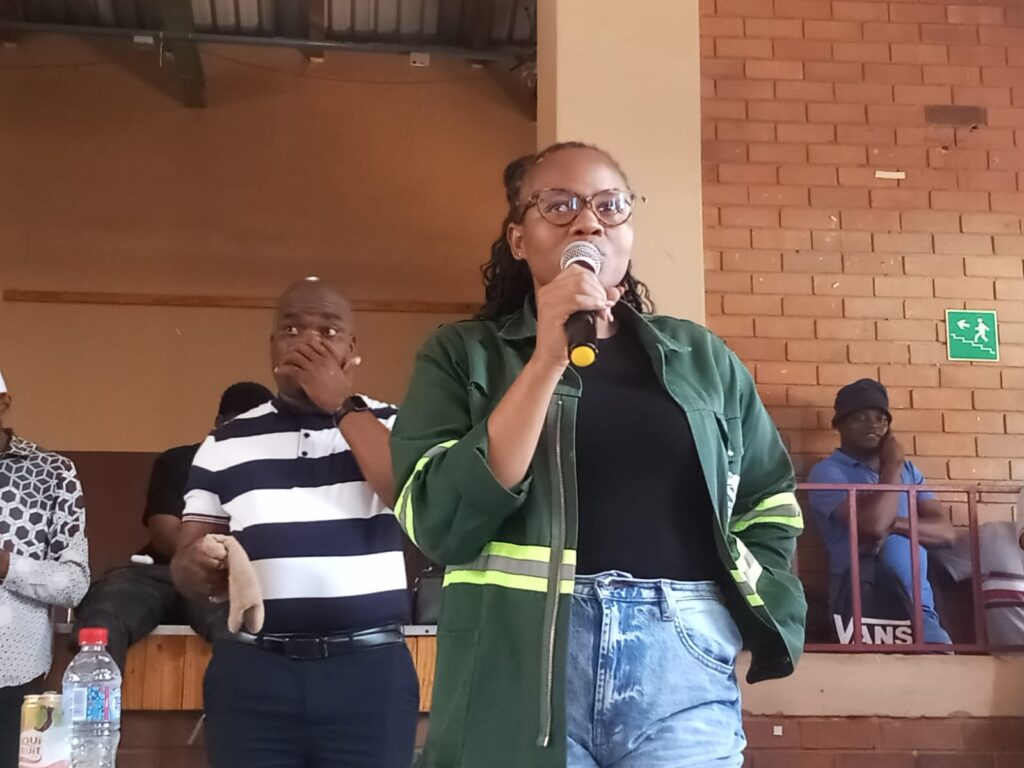 City of Tshwane executive mayor Dr Nasiphi Moya photo by Dimakatso Modipa
City of Tshwane executive mayor Dr Nasiphi Moya photo by Dimakatso Modipa
By Dr Nasiphi Moya
Executive Mayor of Tshwane
The City of Tshwane conducted a wellness visit to Jubilee Hospital in
Hammanskraal to check on patients diagnosed with typhoid fever during October, following a sudden increase in cases during epidemiological week 42 (13–19 October 2025).
During the visit, we engaged with healthcare personnel and patients to assess their recovery and offer support.
We are pleased to confirm that the situation is under control and that there are early signs of stabilisation typhoid cases have been reported in the City of Tshwane.
As of today, only three patients remain in Jubilee Hospital for treatment, and they are all clinically stable.
The City expresses its sincere appreciation to the medical staff at Jubilee Hospital and across the district for their professionalism, dedication and swift response in managing these cases.
We also extend our best wishes for a full recovery to the affected patients and their families.
While there has been a seasonal increase in typhoid cases, this trend is typical
during the warmer months and continues to be closely monitored by the City and
health authorities.
According to the National Institute for Communicable Diseases (NICD), 147 laboratory-confirmed cases of enteric fever (typhoid) were reported
across South Africa between 1 January and 31 October 2025, compared to 139
cases in 2024.
Of these national cases, 48 were recorded in the City of Tshwane, mainly in Hammanskraal and Bronkhorstspruit.
In total 52 cases have now been reported in Tshwane, with the last new cases
reported on 05 November 2025.
Recent data shows early signs of stabilsation of the number of cases, with a potential for a downward trend.
Importantly, all recent water-quality tests confirm that no Salmonella Typhi bacteria have been detected in any municipal or tanker-supplied water sources.
All treated water supplied to residents continues to meet the South African National Standard (SANS 241) for drinking water quality.
The City of Tshwane continues to work closely with the Gauteng Provincial
Government, the Department of Health, the Department of Water and Sanitation,
and the National Institute for Communicable Diseases to ensure coordinated monitoring, accurate information-sharing and full transparency.
The City extends its gratitude to these partners for their continued support and
collaboration in managing this public health matter.
Residents are reminded to practise good hygiene, including washing hands regularly with soap and clean water, safely storing drinking water, and avoiding the use of untreated river or borehole water for domestic purposes.
Anyone experiencing persistent fever, headache or abdominal pain should visit their nearest clinic or healthcare facility without delay.
The City remains committed to protecting public health and to keeping residents
informed through verified and official communication channels.
Tshwane Talks readers have been able to read stories in this publication for free for over two years now. We still want our readers to access our stories for free, but we are asking those among our readers who can afford it to contribute at least R30 a month to cover some of the costs of publishing this independent, non-aligned online newspaper which gives a voice to all sectors of society irrespective of race, colour, creed, religion, or political affiliation. You may make your contribution by depositing at least R30 a month into Tshwane Talks' bank account. Details are as follows:
Bank Details
Bank: Standard Bank
Account Number: 10225548834
Account Type: Cheque Account